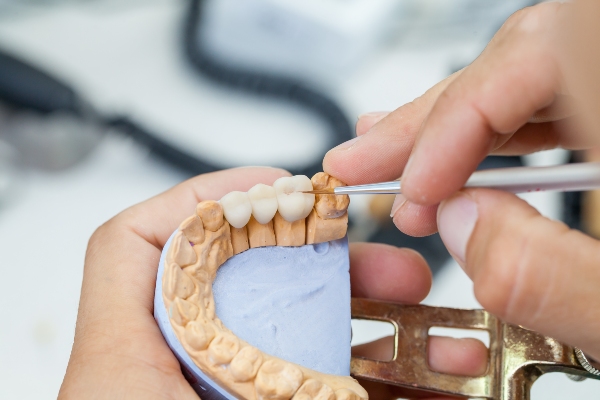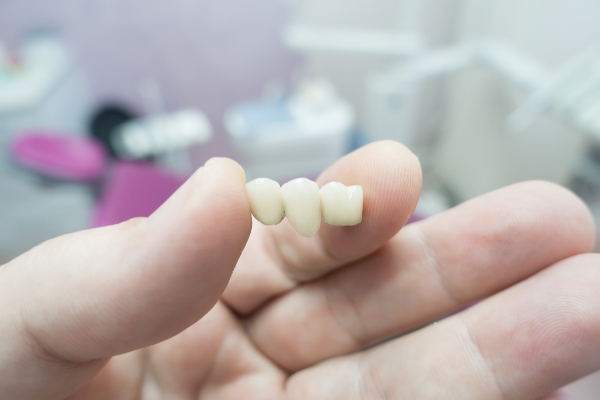Aftercare: Dental Crown Procedure

For many patients, a dental crown is a necessary procedure that is used to help restore a tooth. It is most often needed to repair teeth that have become damaged, decayed, misshapen or discolored. After the tooth is fixed, the crown caps it to restore its appearance and function. While the procedure itself is simple, it is imperative that dental patients follow proper aftercare procedures for fast and proper healing to ensure the longevity of the restoration.
Post-operative crown care information
The following details the proper care dental patients need to adhere to for both temporary and permanent crowns.
Temporary crowns
Temporary crowns are more fragile and extra care is needed to ensure the restoration sets properly and does not crack or fall out. Patients should abstain from eating and drinking for at least 30 minutes following the placement of the temporary cap so the cement can dry. It is important to avoid chewing gum and eating foods that are chewy, hard or sticky as these can dislocate the restoration. Patients should also chew on the opposite side of the mouth from where the crown is placed as much as possible. Tooth brushing should be done gently, and flossing directly around the temporary cap is not recommended.
The temporary crown is typically worn for a period of a few weeks before a permanent one is ready to be placed. A temporary cap that is properly cared for should last until the permanent one is ready to be placed. However, if the temporary does break or fall out, patients should call the dentist office as soon as possible. The dentist may want to replace it while waiting for the permanent cap to come in.
Permanent crowns
It is also important to avoid eating hard and sticky foods or chewing gum during the first 24 hours after a permanent crown is placed while the cement sets. Brushing teeth is allowed, but patients may want to floss more gently during the healing period. The tooth and gums may be sore for the first few days following the restoration, so dentists often advise patients to eat softer foods during the recovery period.
Recovery
The recovery period after the placement of a dental crown is typically a few days. Patients may experience some inflammation, sensitivity and irritation following the procedure that should subside within a week or two. Warm salt water rinses a few times a day are recommended to help reduce swelling of the gums. Any pain issues should be easily managed with over-the-counter medications. If there is still discomfort, soreness or trouble biting after the recovery period, patients are advised to go back to the dentist to make sure the crown does not need any adjustments.
Conclusion
It is vital for patients who have had a dental crown placed to follow proper aftercare instructions for the procedure. Taking diligent care of the restoration can keep the crown strong and ensure a beautiful and lasting smile.
Request an appointment here: https://brimhalldentalgroup.com or call Brimhall Dental Group at (661) 249-1122 for an appointment in our Bakersfield office.
Check out what others are saying about our services on Yelp: Read our Yelp reviews.
Recent Posts
When the smile is missing a tooth or three, a general dentist may recommend dental bridges to restore its appearance and functionality. Even a single missing tooth can cause difficulties with eating and speaking. It also leaves room for the remaining teeth to shift, leading to a misaligned bite. While traditional and implant-supported dental bridges…
Curious about dental bridges? Read on to learn more about this type of restoration. The aftermath of tooth loss can be a struggle. The loss puts extra pressure on the rest of the teeth and chewing becomes less effective. Your speech gets affected too. Fortunately, dental bridges lay out a path to restoring the look…
A denture repair should be your top priority when your denture breaks or becomes damaged. This prosthetic device fills out all the empty spaces in your mouth. It is crucial to care for your denture since the missing teeth can compromise your eating habits, speech, and appearance. This dental device is durable enough to handle…
Missing teeth can negatively impact your smile's appearance and health. However, there are treatments out there that can help. Dental bridges are a common dental restoration that can improve oral health and enhance your smile. A dental bridge can be an effective solution if you have lost a tooth due to decay, injury, or other…


